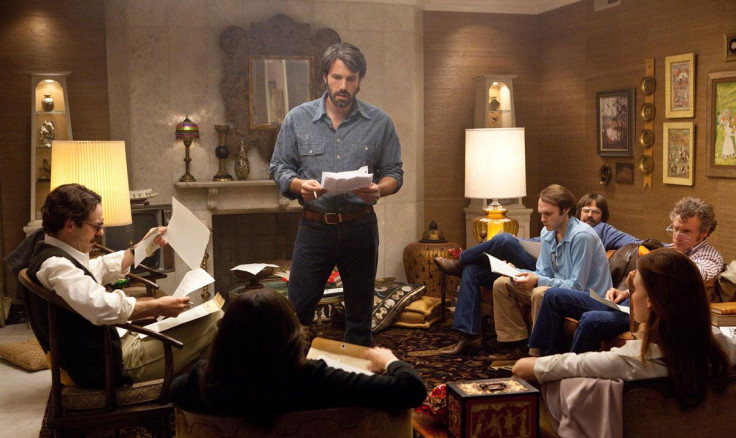‘Argo’ Review: Ben Affleck Pinches Himself In Stranger-Than-Fiction CIA Story

On the heels of his 2010 success, "The Town," Ben Affleck has tackled an underreported story of the Iran hostage crisis -- the dramatic rescue of six escaped American hostages by CIA technical operations officer Antonio Mendez. Adapted from Mendez's book "The Master of Disguise" and Joshuah Berman's 2007 Wired article "The Great Escape," "Argo" goes behind the scenes of what is known as the Canadian Caper, a high-risk mission that allowed the hostages to flee Iran, posing as a Canadian production crew scouting a location for a science fiction movie.
“Argo” is an astonishing, extraordinary story -- as Affleck said in an interview with Vanity Fair, you wouldn’t believe it if it weren’t true. Equally incredible is how long it took for Hollywood to make this film: The CIA files were declassified by President Clinton in 1997 as part of the agency’s 50th anniversary celebration, and Mendez has since spoken and written at length about the dramatic, high-risk rescue.
On Nov. 4, 1979, Iranian revolutionaries stormed the U.S. Embassy in Tehran, protesting the Carter administration’s decision to grant asylum to Mohammad Reza Pahlavi, the recently overthrown and terminally ill Shah of Iran, so that he could receive cancer treatment in the States. The embassy takeover was the culmination of years of Iran’s distrust of the United States -- Iranian citizens resented the U.S. government’s support (driven by oil interests) of the Shah, who reigned for 38 years in what many characterized as a dictatorship.
Islamic revolutionaries captured the Embassy as a symbol of their demands that the Shah be returned to Iran to face punishment. More than 50 hostages were taken, but six U.S. government agents escaped and went into hiding at the home of a Canadian ambassador, while the revolutionaries worked to piece together classified information at the Embassy that had been hastily -- and incompletely -- destroyed.
“Argo” hits the ground running with a speedy background montage and chaotic, claustrophobic images of the Embassy crush; the interweaving of archival footage contributes to the film’s sense of authenticity (which is undermined only slightly by cartoonishly bad 1970s haircuts).
Though Farsi is spoken -- shouted, rather -- in this and other critical scenes, subtitles are completely avoided, presumably in an attempt to capture the isolating disorientation felt by an American in Iran at the peak of the country's anti-Western sentiment. It’s effective, more so if you ignore the fact that many of the Americans working in Tehran were likely fluent in the language.
The rest of the film follows Mendez racing against time to "exfiltrate" the escaped hostages before their would-be captors realize they're missing. After a number of clandestine operations are proposed and swiftly rejected, Tony sees a lightbulb while watching "Planet of the Apes" during a telephone conversation with his young son. Mendez and his best agency ally, Jack O'Donnell (Brian Cranston), pitch their "best bad idea" to their superiors, and Tony sets off to Hollywood to set up a fake production with the help of legendary makeup artist John Chambers (John Goodman) and Alan Arkin's cranky veteran producer Lester Siegel.
The borderline farcical Hollywood sequences balance the weight of the tense scenes in the hostages' increasingly insecure hideout with strong performances from Tate Donovan and Scoot McNairy that perfectly convey the uneasy blend of terror and excitement the hostages feel as they prepare for their high-stakes caper.
“Argo” will prove to all but his most ardent detractors that Affleck is indeed a great director. But as an actor, he is still a bit unsure of himself. While his performance is respectable, it’s just a little too … Affleck. Part of his charm is the palpable sense that, even a decade and a half into his career, he still can’t quite believe he managed to become a movie star. When Affleck is directing himself, the self-conscious vanities are an unwelcome distraction, despite how good he looks with his shirt off. Affleck the director is at his best when he keeps his eyes on the road; too often in “Argo” he can’t resist the urge to steal glances of himself in the rearview mirror.
Just as it’s impossible not to hope for the ship to miss the glacier no matter how many times we see “Titanic,” “Argo” keeps you on the very edge of your seat even though you always know how it’s going to end. This reporter peeled five fingertips clean of fresh nail polish during a protracted airport customs sequence that, when compared to Mendez’s published account of the mission, shows that Affleck and his screenwriter did in fact take some significant liberties, despite the director’s insistence on staying true to the story. No matter: The embellishments work, pulling us even deeper into a story that we were invested in from the very first frame.
The payoff, while well earned, seems to insist on audience applause: Both for the unlikely success of the operation and the Hollywood visionaries who saw the cinematic potential of this incredible story. But just as the CIA officers who pulled off the rescue mission earned their victory dance, “Argo” is a good enough film that we can forgive a little chest-pounding.
© Copyright IBTimes 2025. All rights reserved.





















